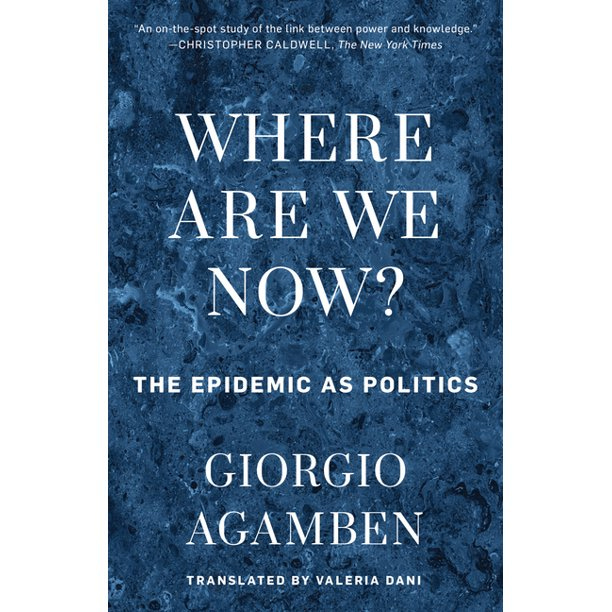uTobian | 25 Nov 2021
New collection of essays by Giorgio Agamben breaks important new ground but does not go nearly far enough in its critique
I just finished reading Where are we now? The epidemic as politics by Italian philosopher Giorgio Agamben. It’s a slim 97-page collection of 21 short essays (I tend to prefer these shorter polemics instead of longer non-fiction books these days). The thesis of the book is sobering. Agamben argues that “bourgeois democracy with its rights, its constitutions, and its parliaments” is ending and the pandemic “state of exception” with its totalitarian diktats by unelected bureaucrats is our politics now.

Overall the essays are hit and miss. I highlight with a pencil as I read and some of the essays are heavily marked up and others pass without a single scratch in the margins at all.
However, chapter 14, Polemos Epidemios (starting on page 59 in the book), is transcendent. It’s an interview with Dimitra Pouliopoulou for the Greek political magazine Babylonia originally published last spring (early in the pandemic). Ms. Pouliopoulou has clearly done her homework and read all of Agamben’s work and she is able to draw from him the best articulation of his ideas. I want to quote a long passage from the interview and then share some additional reflections:
An epidemic, as is suggested by its etymological roots in the Greek term demos (which designates the people as a political body), is first and foremost a political concept. In Homer, polemos epidemios is the civil war. What we see today is that the epidemic is becoming the new terrain of politics, the battleground of a global civil war — because a civil war is a war against an internal enemy, one which lives inside of ourselves.
We are experiencing the end of an era in the political history of the West, the era of bourgeois democracy founded on constitutions, on rights, on parliaments, and on the division of powers. This model was already facing a crisis: constitutional principles were increasingly being ignored, and the executive power had almost entirely replaced the legislative by operating — as it now does exclusively — through legislative decrees.
With the so-called pandemic, things went further: what American political analysts called the ‘Security State’ — which was established in response to terrorism — has now given way to a health-based paradigm of governance that we term ‘biosecurity’. It is important to understand that biosecurity, both in its efficacy and in its pervasiveness, outdoes every form of governance that we have hitherto known. As we have been able to see in Italy — but not only here — as soon as a threat to health is declared, people unresistingly consent to limitations on their freedom that they would never have accepted in the past. We are facing a paradox: the end of all social relations and political activity is presented as the exemplary form of civic participation.
I believe that just a single example clearly shows how deeply the biosecurity regime has transformed all of our democratic political paradigms. In bourgeois democracy, every citizen had a ‘right to health’. This right has now been transformed, without anyone noticing, into a legal obligation to be healthy — an obligation that must be fulfilled at all costs.
That’s brilliant on so many levels.
But here’s what’s strange — and this is what Agamben misses — almost no one is actually healthy. If one does exactly what the W.H.O., C.D.C., or the A.M.A. recommend, one’s health outcomes will be dramatically worse than if one had ignored them completely and just used common sense.
The pharmaceutical industry has captured our political system, regulatory institutions, and the mainstream media (see chapter 5 of my thesis) — and the pharmaceutical business model is now based on keeping as many people as possible as sick as possible for as long as possible in order to maximize their profits.
Under the “state of exemption”, predatory elites with the help of bought and brainwashed bourgeois technocrats are implementing a global system of totalitarianism that resembles “The Matrix”. Going forward, all decisions will be made by the Davos crowd and the rest of us will be enslaved in the metaverse because we are too sick to get our of our beds.
So the “legal obligation” of this new political regime is in fact to be chronically ill “as the exemplary form of civic participation”. Surrendering one’s body to corporate control is “the obligation that must be fulfilled at all costs”. If the Pharma cartel has its way, you will never be healthy again and you will tearfully thank them for this bondage. That’s what we are fighting against and why we must push all in to overthrow this tyrannical regime.
Conclusion: I got a lot out of the book and I’m grateful to Agamben for posing the right question. But as grim as it is, his analysis does not go nearly far enough. If you want to understand the current conjecture and all its implications I highly recommend subscribing to Berenson, eugyppius, el gato malo, Mark Crispin Miller, and Steve Kirsch on Substack — because that’s where the conversation is happening. If you have not done so already, I hope you will subscribe to my Substack as well.
Blessings to all the warriors. 🙏


